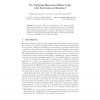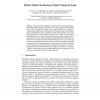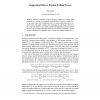100
click to vote
RV
2015
Springer
9 years 10 months ago
2015
Springer
Continuous and hybrid behaviors naturally arise from many dynamical systems. In this tutorial, we present state-of-the-art techniques for qualitative and quantitative reasoning abo...
RV
2015
Springer
9 years 10 months ago
2015
Springer
Abstract. The problem of estimating quantitative properties of distributed cyber-physical software that coordinate and adapt to uncertain environments is addressed. A domain-speciļ...
117
click to vote
RV
2015
Springer
9 years 10 months ago
2015
Springer
Ultra-critical systems are growing more complex, and future systems are likely to be autonomous and cannot be assured by traditional means. Runtime Veriļ¬cation (RV) can act as th...
RV
2015
Springer
9 years 10 months ago
2015
Springer
We study ĀµHML (a branching-time logic with least and greatest ļ¬xpoints) from a runtime veriļ¬cation perspective. We establish which subset of the logic can be veriļ¬ed at runt...
RV
2015
Springer
9 years 10 months ago
2015
Springer
Abstract. Requirements of cyberphysical systems (CPS) can be rigorously speciļ¬ed using Signal Temporal Logic (STL). STL comes equipped with semantics that are able to quantify ho...
RV
2015
Springer
9 years 10 months ago
2015
Springer
In the most comprehensive study on Android attacks so far (undertaken by the Android Malware Genome Project), the behaviour of more than 1, 200 malwares was analysed and categorise...
RV
2015
Springer
9 years 10 months ago
2015
Springer
Abstract. We address the speciļ¬cation and veriļ¬cation of spatio-temporal behaviours of complex systems, extending Signal Spatio-Temporal Logic (SSTL) with a spatial operator ca...
RV
2015
Springer
9 years 10 months ago
2015
Springer
Abstract. Parametric runtime veriļ¬cation is the process of verifying properties of execution traces of (data carrying) events produced by a running system. This paper considers t...
RV
2015
Springer
9 years 10 months ago
2015
Springer
We study the problem of extending RV techniques in the context of (asynchronous) actor systems, so as to be able to carry out a degree of system adaptation at runtime. We propose e...
RV
2015
Springer
9 years 10 months ago
2015
Springer
Runtime veriļ¬cation involves checking whether an execution trace produced by a running system satisļ¬es a speciļ¬cation. However, a simple āyesā or ānoā answer may not ...






